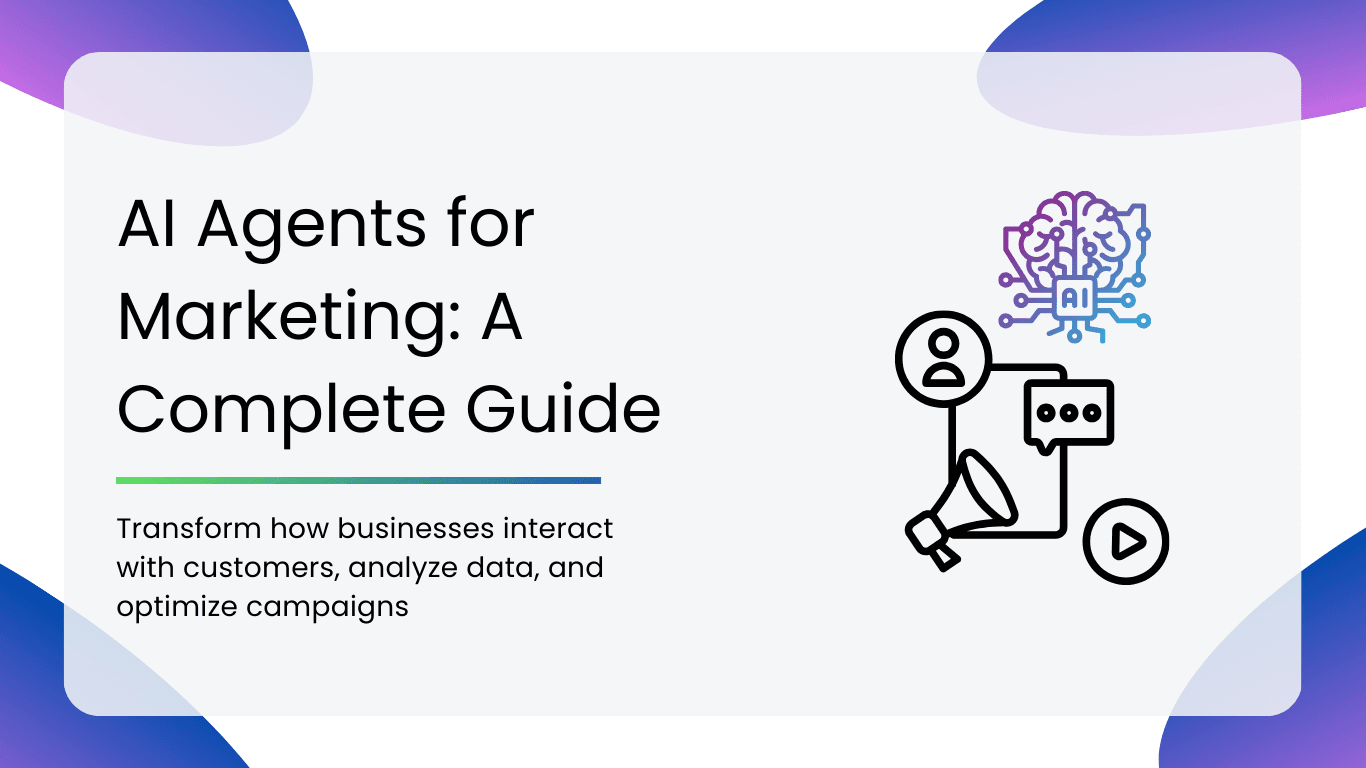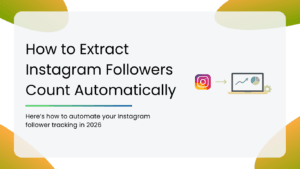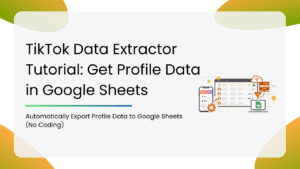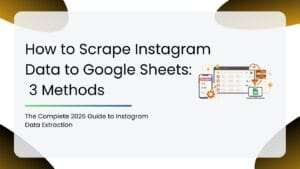If you’ve been keeping up with the latest trends in marketing, you’ve probably heard a lot about AI agents. These smart, automated systems are transforming how businesses interact with customers, analyze data, and optimize campaigns.
With AI agents in your marketing toolkit, you can make smarter decisions, faster. In this guide, we’ll break down what AI agents are, why they matter for marketers, and how you can start using them to take your strategies to the next level.
Let’s get started!
What are AI Marketing Agents?
At their core, AI marketing agents are intelligent, self-learning systems designed to automate, optimize, and enhance marketing tasks. These agents are powered by AI, which allows them to learn from past interactions, predict future outcomes, and continually improve their performance.
Whether it’s engaging with customers in real-time, personalizing content, or automating repetitive tasks, AI marketing agents can handle it all. They help you understand your customers better, deliver more personalized experiences, and free up your team to focus on strategy and creativity.
How AI Agents Work in Marketing
Here’s a breakdown of how these agents operate:
1. Data Intake
AI marketing agents pull in data from various sources like customer interactions, past campaigns, website activity, and social media trends. This data forms the foundation of everything the AI agent will do. The more data the system has, the better it gets at predicting outcomes and understanding customer behavior.
2. Understanding Context
AI doesn’t just look at the numbers; it interprets the “why” behind the data. For example, if a customer browses a product but doesn’t buy, the AI agent will analyze past behavior to understand whether they’re hesitant because of price, product features, or maybe just timing. This contextual understanding helps the AI agent personalize its actions moving forward.
3. Decision-Making
With data and context in hand, the AI agent makes decisions. It could be choosing the best time to send an email, determining the most relevant product to recommend, or predicting which customers are most likely to convert. AI uses algorithms, predictive models, and sometimes even machine learning to weigh different options and choose the best course of action.
4. Execution
Once a decision is made, the AI agent takes action. Whether it’s sending a personalized email, pushing a targeted ad, or recommending a product, the AI executes the decisions automatically. This automation ensures that campaigns run smoothly, and marketing efforts don’t get bogged down in repetitive tasks.
5. Feedback Loop
AI agents are designed to learn and improve over time, and they do so by continuously monitoring performance. The AI agent collects feedback, analyzes the results, and uses it to fine-tune future decisions, making each action smarter than the last.
6. Seamless Integration with Your Marketing Stack
To make all this work, AI agents are integrated with key marketing tools like CRM systems, analytics platforms, ad systems, and content management systems. This means your AI agent can pull in customer data, analyze campaign performance, and even update content in real-time, all while ensuring a smooth flow of information across your entire marketing ecosystem.
Categories of AI Marketing Agents
Here are the categories of AI Marketing Agents:
1. Enterprise-level AI Agents
These are designed for large-scale, complex marketing operations where businesses need to handle vast amounts of data, manage multi-channel campaigns, and streamline workflows across departments. These agents offer robust solutions, integrating with customer relationship management (CRM) systems, data analytics platforms, and marketing automation tools to create highly personalized, data-driven campaigns.
They’re best suited for organizations with a larger marketing budget and the need for advanced AI capabilities to optimize their customer engagement at scale.
Agentforce by Salesforce
By leveraging AI, Agentforce helps businesses predict customer behavior, improve lead quality, and drive higher engagement through personalized outreach. It integrates seamlessly with Salesforce, allowing teams to work smarter.
Key Features:
- AI-Powered Automation: Automates repetitive tasks like data entry, follow-ups, and lead scoring to improve team efficiency.
- Predictive Lead Scoring: Uses AI to rank leads based on their likelihood to convert, helping sales teams prioritize efforts.
- Real-Time Customer Insights: Provides instant analytics on customer interactions, allowing teams to adjust strategies.
- Customizable Workflows: Enable businesses to create tailored marketing workflows that suit their specific needs, automating complex processes.
- Seamless Salesforce Integration: Fully integrates into Salesforce CRM to provide a unified experience and enhanced campaign management.
Breeze by HubSpot
Breeze offers AI-powered tools that streamline marketing operations, ideal for mid-market businesses looking to automate workflows and optimize customer interactions. This AI assistant helps marketers drive higher productivity by automating content creation, optimizing email campaigns, and guiding lead nurturing processes, all while integrating directly with HubSpot’s CRM.
Key Features:
- Smart Workflow Automation: Automates marketing tasks, such as lead nurturing, to save time and effort while improving engagement.
- Personalized Content Recommendations: Suggests content and communication strategies based on customer preferences and previous interactions.
- Behavioral Analytics: Tracks and analyzes customer behavior in real-time to deliver targeted campaigns at the optimal time.
- CRM Integration: Connects seamlessly with HubSpot CRM to ensure that all customer interactions are tracked and followed up on effectively.
- Enhanced Reporting: Provides detailed performance reports, allowing teams to measure the effectiveness of their marketing efforts and make data-driven adjustments.
Oracle Eloqua AI
Oracle Eloqua AI is designed for large enterprises that need a sophisticated marketing automation solution to manage multi-channel campaigns and optimize lead generation. With a focus on predictive analytics and deep data insights, Eloqua AI helps marketers tailor campaigns, improve conversion rates, and forecast future trends using AI-driven tools.
Key Features:
- Multi-Channel Campaign Orchestration: Enables businesses to manage and automate marketing campaigns across email, social media, and digital ads.
- Predictive Lead Scoring: Uses machine learning to predict which leads are most likely to convert, allowing better resource allocation.
- Advanced Segmentation: Helps marketers create highly targeted segments based on customer data, ensuring more relevant communication.
- AI-Driven Personalization: Delivers personalized messages and offers based on customer data, improving engagement and conversion rates.
- Real-Time Analytics: Offers actionable insights in real-time, allowing businesses to quickly adjust their strategies and improve performance.
2. Specialized AI Agents
Specialized AI agents are built to solve niche challenges with laser focus. These tools are perfect for marketers who want to dig deep into a specific area, whether that’s competitive intelligence, language optimization, or customer journey analysis.
By zeroing in on one problem and solving it with precision, specialized AI agents can give marketing teams a sharp competitive edge without the complexity of enterprise-scale solutions.
Pathmatics Explorer AI
Pathmatics Explorer AI provides deep insights into competitive advertising strategies, making it an essential tool for brands that want to understand where competitors are spending and how campaigns are performing across digital channels. It helps marketers uncover ad spend patterns, creative strategies, and audience targeting tactics to refine their own creatives.
Key Features:
- Ad Spend Analysis: Tracks competitor ad budgets across multiple platforms, giving visibility into how much they’re investing.
- Creative Intelligence: Lets you see actual ad creatives used by competitors, including visuals, messaging, and placement.
- Cross-Platform Tracking: Provides insights across display, mobile, video, and social ads to capture the full competitive picture.
- Audience Targeting Insights: Reveals demographic and behavioral targeting strategies used by competitors.
- Benchmarking Tools: Helps marketers measure their performance against standards and competitor benchmarks.
Persado Motivation AI
Persado Motivation AI is all about language, the words, phrases, and tones that drive customers to take actions. This AI-powered platform optimizes marketing messages for maximum conversions by analyzing the emotional and motivational triggers that resonate with audiences.
Key Features:
- AI-Driven Copy Generation: Creates high-converting marketing copy for emails, ads, and websites.
- Emotional Language Analysis: Identifies which emotional tones (urgency, trust, excitement) work best for your audience.
- Conversion-Focused Testing: Continuously tests variations of languages to find the most effective messaging.
- Channel-Specific Optimization: Tailors messaging for email, social media, SMS, and paid ads.
- Performance Insights: Provides real-time reporting on which words, phrases, and tones deliver the highest ROI.
Heap Illuminate
Heap Illuminate specializes in behavioral data analysis, helping marketers understand how customers move through digital journeys. Instead of relying on assumptions, it uses AI to surface insights about what actions lead to conversions, drop-offs, or retention.
Key Features:
- Automated Journey Mapping: Automatically uncovers key user paths without manual tagging or setup.
- Behavioral Analytics: Analyzes customer behavior to identify bottlenecks, drop-offs, and success patterns.
- Predictive Insights: Uses AI to predict which behaviors are most likely to result in conversions.
- No-Code Setup: Requires minimal technical expertise, making it accessible for marketing teams.
- Customizable Dashboards: Delivers clear, visual insights for teams to take immediate action on customer experience improvements.
3. Content Creation & Management Agents
Creating content that’s engaging, SEO-friendly, and consistent with your brand voice can feel like a never-ending task. That’s where content-focused AI agents come in. These tools are built to support marketers at every stage of the content lifecycle. They help you cut down the time spent on content creation while ensuring every piece is strategically aligned with your marketing goals.
Frase AI
Frase AI makes content creation smarter by combining research, SEO optimization, and briefing into one streamlined tool. It helps marketing teams identify what audiences are searching for, create content briefs based on real data, and visualize content to improve rankings and visibility.
Key Features:
- AI-Powered Content Briefs: Automatically generates content outlines based on top-ranking pages and search intent.
- SEO Optimization: Suggests keywords, headings, and topic clusters to boost organic visibility.
- Competitor Analysis: Shows how content compares to competitors on search rankings and keyword usage.
- Content Gap Identification: Highlights missing topics or questions your audience is searching for.
- Performance Tracking: Monitors how optimized content performs over time in SERPs.
MarketMuse
MarketMuse is a strategy-driven AI tool that helps marketers build strong content roadmaps through topic modeling and deep SEO insights. Instead of guessing what to write next, it provides data-backed recommendations on the best topics and angles to target.
Key Features:
- Topic Modeling: Maps out high-value topics and subtopics to strengthen your content authority.
- Content Scoring: Evaluates your content’s quality and comprehensiveness against competitors.
- AI-Generated Briefs: Provides detailed outlines that guide writers on structure, keywords, and depth.
- Gap & Opportunity Analysis: Identifies content opportunities that competitors are missing.
- Long-term Strategy Alignment: Helps create a content roadmap that aligns with both SEO and business goals.
Writer.com
Writer.com focuses on keeping your brand voice consistent across all content, whether generated by humans or AI. It ensures that tone, style, and messaging guidelines are followed, so every email, blog, or ad sounds like it’s coming from the same brand identity.
Key Features:
- Brand Voice Enforcement: Sets tone and style guidelines to ensure consistency in all communication.
- Grammar 7 Style Checking: Goes beyond spellcheck to enforce brand-specific writing rules.
- AI-Powered Content Suggestions: Suggests edits and rewrites to improve clarity and alignment with your brand.
- Collaboration Tools: Allows teams to work together while keeping messaging unified.
- Multi-Channel Consistency: Ensures uniform voice across blogs, emails, ads, and internal documents.
4. Customer Engagement Agents
Customer engagement is no longer just about sending out newsletters or running ads; it’s about building ongoing, meaningful conversations with your audience. Customer engagement AI agents are designed to do exactly that. They power real-time interactions, streamline sales processes, and enhance customer support.
By combining conversational AI with automation, these agents not only improve customer satisfaction but also help brands boost retention, close more deals, and deliver consistent, personalized experiences across channels.
Tidio Lyro AI
Tidio Lyro AI is built for live chat and customer support automation, making it a perfect tool for businesses that want to handle high volumes of customer queries without overwhelming their teams. It ensures customers get instant answers.
Key Features:
- Conversational AI for Live Chat: Handles customer queries in real-time with human-like responses.
- Support Automation: Automates FAQs, order tracking, and other routine tasks.
- Multilingual Capabilities: Engages customers in multiple languages, enhancing accessibility.
- Seamless Agent Handoff: Transfers chats to human agents whenever queries require a personal touch.
- Analytics Dashboard: Provides insights into customer interactions to improve support quality.
Drift Conversational AI
Drift Conversational AI is geared towards B2B businesses looking to accelerate sales engagement. From booking meetings to qualifying leads in real-time, Drift ensures prospects don’t fall through the cracks.
Key Features:
- Real-Time Lead Qualification: Identifies and qualifies buyers as they interact with your site.
- Automated Meeting Booking: Instantly schedules meetings with sales reps, reducing delays in the sales cycle.
- Personalized Playbooks: Delivers tailored conversational flows based on buyer personas and behavior.
- CRM & Sales Tool Integration: Connects with Salesforce, HubSpot, and Salesloft to sync customer data.
- Performance Tracking: Offers analytics on conversations, conversions, and pipeline impact.
Kustomer IQ
Kustomer IQ focuses on orchestrating customer service with AI at its core. Designed for companies handling complex customer journeys, it centralizes conversations across channels and empowers support teams with AI-driven recommendations and insights.
Key Features:
- Omnichannel Engagement: Brings customer conversations from email, chat, social, and more into a single dashboard.
- AI-Powered Case Routing: Automatically directs queries to the right support agents or workflows.
- Smart Knowledge Base: Suggests relevant help articles to both customers and agents in real-time.
- Customer Journey Insights: Maps customer history and preferences for more personalized support.
- Automation & Self-Service: Reduces agent workload by automating routine queries and enabling customer self-service.
Key Benefits of Using AI Marketing Agents
AI marketing agents are becoming more than just time-savers. They amplify how businesses connect with audiences and scale campaigns. Some standout advantages include:
- Always-On Execution: Agents work around the clock, continuously running, testing, and adapting campaigns without downtime.
- Sharper Targeting: By tapping into real-time data, they refine segmentation and deliver hyper-relevant messages.
- Speed at Scale: Campaign cycles that once took weeks can now be executed in days, or even hours, with minimal manual intervention.
- Consistent Personalization: Whether it’s a one-to-one email or a nationwide campaign, agents ensure messaging stays aligned and personalized at every touchpoint.
Factors to Consider Before Choosing an AI Marketing Agent
Not every AI marketing agent is a perfect fit for every business. Before investing, weigh these factors carefully:
- Integration Capabilities: Ensure the agent connects seamlessly with your existing CRM, CMS, analytics, and ad platforms to avoid silos.
- Automation vs. Oversight: Decide how much control you want, fully automated decision-making, or AI suggestions with human approval.
- Data Compliance: Check whether the solution supports regulations like GDPR or CCPA, especially if you handle sensitive customer data.
- Budget & Scalability: Balance upfront costs against long-term scalability. A lightweight tool may suffice for startups, but enterprises often need robust, customizable platforms.
AI marketing agents are no longer futuristic add-ons; they’re becoming essential co-pilots for modern marketing teams. The key isn’t just adopting AI, but adopting it thoughtfully and choosing tools that align with your data ecosystem, compliance needs, and long-term growth goals.
Businesses that strike the right balance between automation and human creativity will be best positioned to build stronger customer relationships and stay competitive in an AI-driven future.
Curious to know more about how AI is impacting different industries? Check out our other blogs:
- Best AI Market Research Tools for Smarter Insights
- Best Shopify AI Tools To Grow Your Store in 2025
- Best AI Podcast Tools for Podcasters in 2025
FAQs
AI agents are designed with APIs and plug-ins that connect directly to common tools like HubSpot, Salesforce, Google Ads, or analytics dashboards. They pull real-time data, automate workflows, and optimize campaigns without requiring teams to leave their existing platforms.
Budgets can range from $500/month for smaller SaaS tools to enterprise contracts of $50K+ annually. ROI timelines typically range from 3 to 6 months, with cost savings from reduced manual effort and improved targeting often being the first measurable wins.
Smaller teams should start with plug-and-play AI SaaS tools that don’t require coding. Partnering with agencies or using pre-built workflows in Zapier can also help teams gain AI leverage without heavy infrastructural changes.
Key metrics include:
– Campaign performance (CTR, conversions, ROAS)
– Lead quality improvements
– Customer engagement/personalization lift
– Time/cost saved on manual tasks
– Speed of campaign execution
Marketers should align with frameworks like GDPR, CCPA, and AI transparency guidelines. Responsible use means:
– Avoiding biased data in training models
– Maintaining data privacy and consent standards
– Being transparent when users interact with AI-driven experiences
– Regularly auditing agent decisions for fairness and accuracy
Disclosure – This post contains some sponsored links and some affiliate links, and we may earn a commission when you click on the links at no additional cost to you.
